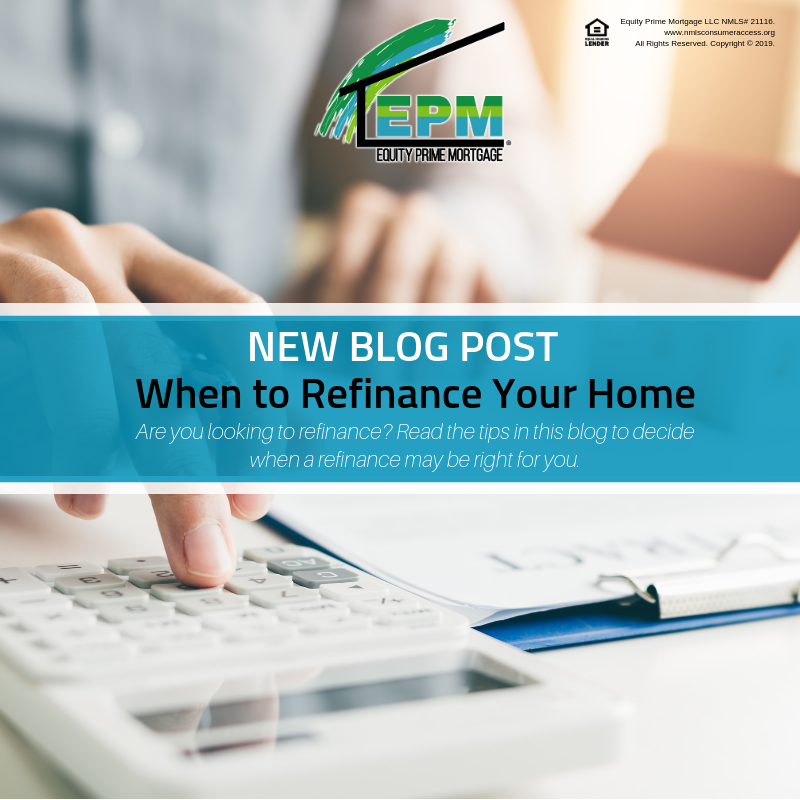When to Refinance Your Home

Posted by Eric Skates on
If you're a homeowner and you're in need of extra money, you may wish to consider refinancing your mortgage. When you refinance your home, you obtain a new mortgage to replace your current loan. Refinancing can be an excellent way to save on interest and monthly payments.
Types of Refinances
There are two main types of mortgage refinances: a rate-and-term refinance and a cash-out refinance.
Rate-and-Term
The rate-and-term refinance option is the most common. With this type of refinance, the interest rate, the term of your loan, or both will be different from your original mortgage. For example, you may refinance from a 30-year mortgage to a 15-year mortgage.
Cash-Out
In a cash-out refinance, you borrow more than you owe on your current mortgage, and you receive the difference. A cash-out refinance may be right for you if you want to pay off debt, or finance a home renovation project.
When Should You Refinance?
People refinance their homes for many different reasons. Here are several common cases where refinancing may be a good option.
Lower Interest Rate
One of the most common reasons to refinance is to obtain a lower interest rate. You should look into refinancing if mortgage rates are one to two percent below your current rate.
Improved Credit Score
One of the most significant factors in your mortgage rate is your credit score. In general, the higher your score, the lower the mortgage interest rate you'll receive. If your credit score has significantly improved since you purchased your home, refinancing could save you quite a bit of money in interest.
Shorter Term
If your income has increased since purchasing your home, you may wish to pay your mortgage off more quickly. While you can do so by adding extra money to your monthly payments, refinancing may be an even better option. By refinancing your 30-year mortgage into a 15-year mortgage, you can get a lower interest rate.
Convert an Adjustable Rate Mortgage to a Fixed Rate
With an adjustable-rate mortgage (ARM), the interest rate will go up and down over the life of the loan. Your rate will depend on market conditions as well as your credit score. The rates of some ARMs change annually, while others have rates that adjust after five years or seven years. While an ARM may offer low payments early in the loan term, the risk is that your payments may increase significantly when interest rates go up. If you have an adjustable-rate mortgage and you're concerned about your payments increasing, consider refinancing to a fixed-rate loan.
Consolidate Debt
If you want to pay off high-interest debt such as credit cards, a cash-out refinance can be a good way to do so. Your mortgage loan will have a lower interest rate than a credit card. However, it's important to be careful not to generate additional debt after you refinance your home. While credit card debt is unsecured, your home is collateral for a mortgage.
Is Refinancing Right for You?
As you decide whether refinancing is best for you, consider these factors.
Closing Costs
The typical cost of refinancing a home is between 3% and 5% of the total loan amount. Some lenders offer a "no-cost" option; however, you will usually pay a higher interest rate to accommodate the closing costs.
Do You Plan to Stay in Your Home?
If you plan to sell your home in the next year or two, refinancing may not be the best option. It often takes a few months or years to break even after refinancing. For example, if you pay $2400 in closing costs and you save $100 per month compared to your prior mortgage, you'll recoup your costs in 24 months.
When you're ready to refinance your home, Equity Prime Mortgage can help. Contact us today to get more information at 877-255-3554 or click here to get started.



